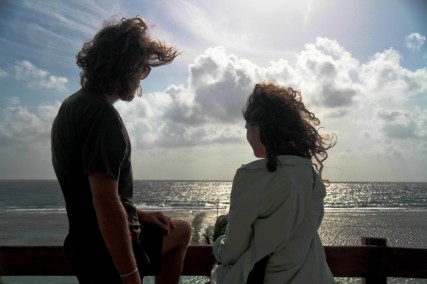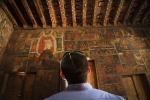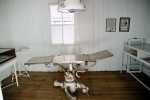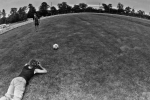Author crosses thresholds of life
[wptab name=’Part One’]Already on our second mojito, I finally motivate myself to check my email. Sam has just wandered into the shimmering Atlantic, heading out for a boozy afternoon snorkel. Gab, Flo and I are bantering about documentaries and production company names and their film school in Cuba.
Flo and Gab clearly adore each other. I haven’t seen Gab since she was a bridesmaid at our wedding two years ago. When Sam and I greeted them at the Cancun airport, we were fat, white Americans compared to their bronzed bohemia. But their blossoming romance is contagious and our holiday in the Yucatan, powered by a rental Jeep, has a very special sheen to it.
“Is she dead?” I had asked Sam right before he left for the sea. He had been checking his email since we arrived in Mexico, gearing up for his new position as man-on-the-ground for a microenergy start-up in East Africa.
But Sam hadn’t been sent the email about Didi passing away.
So as our third mojito arrives, I open Sam’s computer, log in to my account and learn the news of my grandmother’s death from my older brother Roly, who has been trying to contact us for the past 72 hours.
It takes me 24 hours to make the decision to fly home for the funeral. The flight will be 26 hours, we will be in Sydney for 48 hours, then another 26 hour flight to Houston for 48 hours, then another 26 hours to Kampala, Uganda, ready for Sam to begin work.
Margaret Lillian Stokes is my Dad’s mum and was 91 years old when she died of a ‘cerebrovascular accident’. Born the same day the Sydney Harbour Bridge was infamously opened, Didi was witness to vast ideological and technological change. Mother to five, grandmother to 15, great-grandmother to three, Didi’s mind was sharp with the theatre of life until the day her body failed (which is I think what the doctor meant to say on the death certificate).
Our flight from Cancun is delayed over three hours and we miss the connecting flight to Sydney from San Francisco. The dreamy fog of Mexico lifts and I become hysteric with frustration and am finally able to cry tears of sadness and grief and sentiment, not for my grandma’s death but for the missed ritual with my family. This is an important milestone in the story of my family and in the face of the United air hostess, all the sadness of this chosen life of distance crystalizes and I feel both very far from my home and very much at home with Sam, who holds my hand as we catch a bus to a courtesy airport hotel.
[/wptab] [wptab name=’Part Two’]Didi would be amused to know that I’m able to watch the funeral on Skype, Roly’s iPhone passing from family member to family member, sharing the burden of having me there.
I’m surprised by how intimate it feels to attend the service in this way.
Didi’s casket sits under the large plain tree she planted next to the tennis court at Tiliara, probably years before the tennis court was there. Tiliara is the epicenter of the Stokes family and means ‘end of the rainbow’ in the local Aboriginal language. As a child I would play for hours with the dressing up box in the sunroom, while the adults played tennis and prepared salads for the afternoon BBQ.
My mum is the funeral celebrant, and although she has been divorced from my Dad for decades, her key involvement in the ceremony reflects how woven in place she is.
In the final weeks of her life, Mum worked every other day as Didi’s full-time caretaker. Mum said it was primarily for the money but I know she also found this proximity an incredible privilege. As part of the service, Mum recounts conversations she had with Didi in the last weeks of her life.
On the day I left for Houston to spend my first Christmas with Sam’s family, I visited Didi, and Mum, at the nursing home. With the sunlight creeping around the drawn curtains, I was acutely aware that this was a special moment in the presence of the two most significant female influences in my life. I told Didi about the stories I was hoping to produce in Uganda, about Kony and HIV and white water rafting. I told her about our plans to live in Tanzania and about the work Sam was going to do. She mustered her limited energy to ask questions to keep my monologue going. When it came time for me to head to the airport, she held my hand and said,
“Have a good life,” and she laughed self-consciously, realising how final that sounded.
Later, as I was about to board my flight, Mum called. Didi had something to say to me.
“My deepest love to you, Miranda,” she said in a hoarse voice.
I tell Dad about this and his comment is,
“Well, that’s more than she ever said to me.”
Daughter of the Depression, born into a family of Christian Scientists, married to a WWII veteran and businessman, Didi was more about stoicism than sentiment.
[/wptab] [wptab name=’Part Three’]Sam and I are now finally in Africa. I spent the morning bouncing around the northern hills of Kampala in a beat up sedan with Daniel, a real estate agent who introduces himself as the best in the business.
In the first days of life here, Sam and I have decided to base ourselves in Uganda rather than Tanzania, as was the plan. From all accounts, Dar Es Salaam is a more abrasive city. Reports of violence and unrest remind me of life in Port Moresby. The lure of the ocean and the vague prospect of work with BBC Media Action isn’t worth that anxiety.
I’m now back at the house we’re staying in, sipping cold water and eating lentils and rice. I have a fan occilating against my shoulders while the midday sunburns outside. The exchange with Daniel this morning raises so many questions about our expectations for the next two years, living as foreigners, attempting to reconcile our own cultural values with the day-to-day life of the jungle.
My uncle Peter has lived as an expat for most of his adult life. As part of his eulogy, he spoke of Didi’s principles for building a home.
“To me as a child, our family home was comforting, warmth, harmony, predictable routine, interspersed adventure, space, mandated activity outdoors, encouragement, animals and pets, family conversations over meals to look forward to, welcoming hospitality – to homeless hitchhikers, people from anywhere and everywhere, ‘raging’ teenagers, and afternoon tea spreads with stay-on for ‘tea’. This seems a reasonable checklist for family, bringing up children – and living – in any age.”
When Didi was our age, she was not afforded choice like we are. We can live anywhere and never feel too far from home. We can call family and see their face anytime of day, hear their voice and connect. But Didi’s values sit deep inside me and as we set up our life in Kampala, I’ll follow her recipe for building a home.
[/wptab] [end_wptabset]




